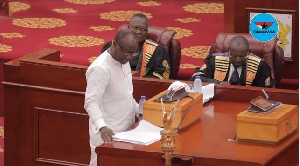Business News of Tuesday, 28 November 2017
Source: thefinderonline.com
Fitch predicts 5.7% budget deficit
Ghana’s budget deficit will end 2018 at 5.7 percent of the country’s Gross Domestic Product (GDP), BMI, research arm of Fitch Ratings, has predicted.
This is against its own earlier projection of 6.5 percent for the next fiscal year. What this indicates is that there will be some level of fiscal space for government to spend on developmental projects.
In the 2018 Budget presented to parliament, the Finance Minister, said overall budget deficit on cash basis as percentage of GDP at the end of September 2017 was 4.5 percent. Government’s target for this year was 6.5 percent budget deficit of GDP.
BMI noted that fiscal consolidation will press ahead in Ghana due to the government's ongoing fiscal reforms and increasing oil revenue, adding, although the country's public debt burden is becoming more sustainable, debt is still growing and the government's contingent liabilities represent a potential risk to consolidation.
“We expect that the combination of increasing revenues from the hydrocarbons sector and several important fiscal reforms will drive a narrowing of Ghana's fiscal deficit over the coming quarters. We believe that several new policies aimed at furthering fiscal consolidation - highlighted in the 2017/18 budget - will be successful in both broadening the tax base and reducing expenditure.”
It added that “the introduction of the National Digital Address System will end the loophole whereby businesses can register a landmark as their address. This will likely significantly increase the number of businesses in the formal economy, while also making it easier to identify individuals for income tax, broadening the tax base.”
On the nation’s public debt sock, BMI said the debt position is improving but vulnerable. “We believe that debt will continue to decline relative to GDP in the coming years due to a shrinking fiscal deficit and robust economic growth”.
The 2017-18 budget statement of November 2017 highlighted that Ghana's debt burden had fallen to 68.6 percent of GDP at the end of September 2017, down from 73.0 percent of GDP at the end of December 2016. It also stated that the rate of debt accumulation had slowed to 13.5 percent year-on-year in September 2017, compared to 21.9 percent in 2016.
“As we expect that the fiscal deficit will decline further and that real GDP growth will increase to 7.5% in 2018, the rate of debt accumulation is likely to continue slowing. Though this constitutes an improvement in Ghana's debt dynamics, public debt is still increasing in absolute terms”, BMI noted.
It explained that while deficits will likely remain relatively large compared to elsewhere in Sub-Saharan Africa, it expect that the debt position will remain sustainable thanks to strong economic growth and smaller deficits going forward.
However, it stated that the debt was still increasing in absolute terms - albeit at a slower rate than GDP - and several contingent liabilities remain a threat to fiscal consolidation.”











